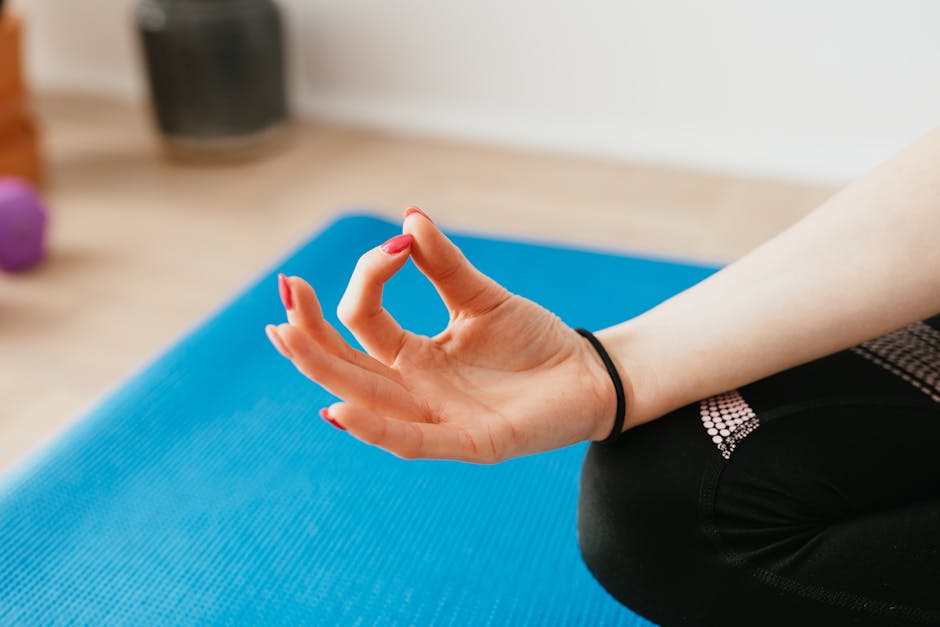Chronic stress can be a real pain in the neck, but did you know that yoga meditation can help alleviate its symptoms? This blog post will delve into the fascinating world of yoga meditation and its potential to combat chronic stress. So, why should you keep reading? If you’re tired of being a stress ball and are seeking a natural, effective way to manage your stress levels, this post is for you!
Key Takeaways
- Yoga meditation can help reduce symptoms of chronic stress.
- The practice of yoga meditation involves mindfulness and controlled breathing techniques.
- Yoga meditation can have a positive impact on your nervous system and stress hormones.
- Incorporating yoga meditation into your daily routine can lead to long-term stress reduction and improved emotional health.
- Scientific research supports the benefits of yoga meditation for stress management.
Introduction to Yoga Meditation and Chronic Stress
Definition of Yoga Meditation
Yoga meditation is a mind-body practice that combines physical postures, breathing exercises, and meditation to promote physical and mental well-being. It’s a holistic approach to wellness that can help you find inner peace and balance.
Overview of Chronic Stress
Chronic stress is a prolonged and constant feeling of stress that can negatively affect your health if it goes untreated. It can cause a variety of symptoms, including headaches, sleep problems, and difficulty concentrating. Chronic stress can also lead to more serious health problems like heart disease and depression.
Purpose of the Blog Post
This post aims to explore how yoga meditation can help manage and reduce the symptoms of chronic stress. We’ll delve into the mechanisms of yoga meditation, its benefits, and how to incorporate it into your daily life.

Understanding How Yoga Meditation Works
Mechanisms of Yoga Meditation
Mindfulness
At the heart of yoga meditation is mindfulness, a mental state where you focus on your awareness of the present moment, while calmly acknowledging and accepting your feelings, thoughts, and bodily sensations. This practice of being present can help you disconnect from the stressors of your daily life and find a sense of peace and calm.
Breathing Techniques
Yoga meditation also involves controlled breathing techniques. These techniques can help slow your heart rate and lower your blood pressure, promoting a state of relaxation and helping to reduce stress.
The Role of Yoga Meditation in the Nervous System
Impact on the Autonomic Nervous System
Yoga meditation can have a positive impact on your autonomic nervous system, which controls your body’s unconscious functions, including your heart rate, digestion, and respiratory rate. By promoting relaxation, yoga meditation can help balance your autonomic nervous system, reducing the effects of stress.
Reduction of Stress Hormones
Yoga meditation can also help reduce the levels of stress hormones in your body. High levels of these hormones, particularly cortisol, can lead to symptoms of chronic stress. By helping to lower these levels, yoga meditation can help alleviate these symptoms.

Benefits of Yoga Meditation in Stress Management
Reduces Stress
Immediate Relief from Stress Symptoms
Yoga meditation can provide immediate relief from the symptoms of stress. By focusing on your breath and being present, you can help your body and mind relax, providing immediate relief from the physical and mental symptoms of stress.
Long-term Stress Reduction
Regular practice of yoga meditation can lead to long-term stress reduction. By incorporating yoga meditation into your daily routine, you can help manage your stress levels and prevent chronic stress from taking hold.
Controls Anxiety
Yoga meditation can also help control anxiety. The practice of mindfulness can help you manage your worries and fears, reducing feelings of anxiety.
Promotes Emotional Health
Yoga meditation can promote emotional health by helping you develop a better understanding of yourself and your emotions. This self-awareness can lead to improved self-esteem and a more positive outlook on life.
Enhances Self-Awareness
Through the practice of mindfulness, yoga meditation can help enhance your self-awareness. This increased self-awareness can help you recognize your stress triggers and better manage your reactions to them.

Scientific Evidence Supporting Yoga Meditation
Research Studies on Yoga Meditation and Stress
Study Findings on Stress Reduction
Several research studies have found that yoga meditation can help reduce stress. For example, a study published in the Journal of Clinical Psychology found that participants who practiced yoga meditation reported lower levels of stress and anxiety.
Effects on Anxiety and Depression
Research has also found that yoga meditation can have a positive effect on anxiety and depression. A study published in the Journal of the American Medical Association found that participants who practiced yoga meditation saw a significant reduction in their symptoms of anxiety and depression.
Meditation and Physical Well-being
Impact on Blood Pressure and Heart Rate
Yoga meditation can also have a positive impact on your physical well-being. Research has found that it can help lower blood pressure and heart rate, both of which can be elevated by chronic stress.
Improvement in Sleep Quality
Chronic stress can often lead to sleep problems. However, research has found that yoga meditation can help improve sleep quality by promoting relaxation and reducing stress.

Practical Ways to Incorporate Yoga Meditation into Daily Life
Everyday Practices for Meditation
Simple Meditation Techniques for Beginners
If you’re new to yoga meditation, start with simple techniques like focusing on your breath or repeating a mantra. These techniques can help you get started and become comfortable with the practice of meditation.
Incorporating Meditation into Routine
Try to incorporate meditation into your daily routine. Even just a few minutes each day can make a difference. You might meditate in the morning to start your day on a positive note, or in the evening to help unwind and relax before bed.
Building Your Meditation Skills
Tips for Enhancing Meditation Practice
As you become more comfortable with meditation, you can try different techniques and find what works best for you. You might try guided meditations, or use apps or online resources to help enhance your practice.
Overcoming Common Challenges in Meditation
Meditation can be challenging, especially when you’re first starting out. But don’t get discouraged. Remember, it’s a practice, and it’s okay if your mind wanders or if you find it difficult to relax. With time and practice, it will become easier.
Conclusion
Summary of Key Points
Yoga meditation can be a powerful tool for managing and reducing the symptoms of chronic stress. Through mindfulness and controlled breathing techniques, it can promote relaxation, reduce stress hormones, and have a positive impact on your nervous system. Regular practice can lead to long-term stress reduction, improved emotional health, and enhanced self-awareness.
Encouragement to Try Yoga Meditation
If you’re struggling with chronic stress, why not give yoga meditation a try? It’s a natural, effective way to manage stress and promote overall well-being. And remember, it’s not about being perfect. It’s about finding what works for you and taking steps towards a healthier, less stressful life.
Final Thoughts on Yoga Meditation as a Tool for Managing Chronic Stress
Chronic stress can take a toll on your health and well-being, but yoga meditation can offer a path towards relief. So why not roll out your yoga mat, take a deep breath, and start your journey towards a more peaceful, stress-free life?
Remember, the journey of a thousand miles begins with a single step. Or in this case, a single breath. So take that breath, and let the journey begin.
Unwind Your Mind: FAQs on How Yoga Meditation Can Ease Chronic Stress
What is yoga meditation, and how does it differ from other forms of meditation?
Yoga meditation is a practice that combines physical postures, breathing exercises, and focused attention to achieve a state of deep relaxation and mindfulness. Unlike some forms of meditation that primarily involve sitting still and observing thoughts, yoga meditation often incorporates movement and can be more accessible to people who find it difficult to sit still for long periods. The goal is to unify the body, mind, and spirit, promoting a sense of peace and well-being.
Can yoga meditation actually reduce symptoms of chronic stress?
Yes, numerous studies have shown that regular practice of yoga meditation can significantly reduce symptoms of chronic stress. It does so by lowering levels of cortisol, the body’s stress hormone, and by enhancing mood and overall sense of well-being. Additionally, the focus on breathing and mindfulness during yoga meditation can interrupt stress response cycles, helping individuals manage their reactions to stress more effectively.
How often should I practice yoga meditation to see benefits for stress?
Consistency is key when it comes to yoga meditation. Most research suggests practicing for at least 10 to 20 minutes a day to see a reduction in stress levels. However, even shorter periods of practice can be beneficial, especially when starting out. The most important aspect is to make it a regular part of your routine.
Do I need to be flexible or in good shape to start yoga meditation?
Not at all. Yoga meditation is accessible to people of all fitness levels and body types. There are various styles and poses that can be modified to suit your physical condition and comfort level. The focus is on your own journey and connecting with your body, not on achieving perfect poses.
What are some specific yoga meditation techniques for stress relief?
Several techniques are particularly effective for stress relief, including mindful breathing, where you focus solely on your breath; guided imagery, where you visualize a peaceful scene or outcome; and progressive muscle relaxation, where you tense and then relax different muscle groups. Incorporating these techniques into your yoga practice can enhance the stress-relieving effects.
Can yoga meditation help with anxiety and depression as well?
Absolutely. Yoga meditation has been shown to reduce symptoms of anxiety and depression by promoting relaxation, improving mood, and decreasing physiological markers of stress. It encourages a focus on the present moment, which can help break cycles of negative thoughts that often accompany these conditions.
Are there any risks or side effects to practicing yoga meditation?
Yoga meditation is generally considered safe for most people. However, it’s important to listen to your body and avoid positions or practices that cause pain or discomfort. If you have a history of mental health issues, it’s a good idea to consult with a healthcare provider before starting any new meditation practice, as intense focus on internal states can sometimes bring up emotional discomfort for some individuals.
How can I get started with yoga meditation?
Getting started is simple. You can find numerous resources online, including guided meditations and instructional videos for beginners. Many communities offer yoga classes that incorporate meditation, which can also provide a supportive environment for learning. Start with short sessions and gradually increase your practice time as you become more comfortable with the techniques.



